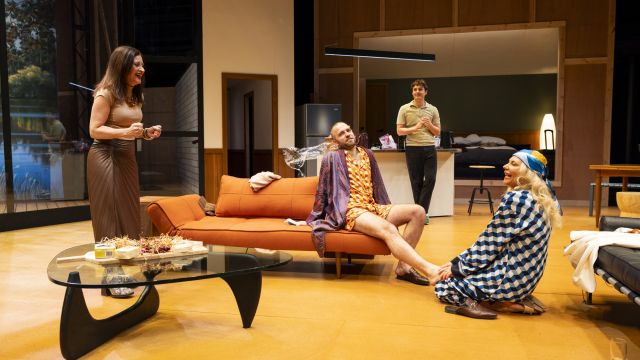This is Living
In Ash Flanders’ play, when a character says, ‘This is Living’, it could mean that ‘this is really living’, referring to the luxurious Airbnb country house some friends have rented for three days. Or it could mean, ‘This is our lives, and it’s as good as it’s gonna get.’
Hugh (Marcus McKenzie), diagnosed with cancer, nauseous and bad-tempered after chemo and multiple drugs, has rented a spacious house near Hepburn Springs. With his over-attentive but bewildered partner Will (Wil King) he’s invited old mates Alex (Belinda McClory), a TV personality and fashion maven, Jo (Maria Theodorakis), a TAFE drama teacher, and Sharleen (Michelle Perera) a rich divorcee – all three straight, childless and in their 50s. The idea is to bring in the New Year (even if they can’t see the fireworks) and there is plenty of champagne. What happens as well is great deal of bitchy bickering and the raw emotions between Hugh and Will.

Much depends on the female characters’ elaborate backstories since they have all been ‘friends’, connected to each other in various ways, for years. The women’s drama, in fact, depends on these backstories, hauled out and raked over to fuel the conflicts. We can care or not about their past tribulations, but we have a great deal of exposition to absorb. It’s the past released – or erupting - into the present under pressure.
The pressure comes from being stuck there in the house, their maybe-dying host, alcohol, drugs, and the crises, frustrations and disappointments in their own lives. But it’s also often difficult to grasp the complexities of their relationships given the rapid fire and sometimes overlapping dialogue. Numerous audience members complained later that they could not hear or understand much of the dialogue – and it’s a very talky play. It’s strange given that all the cast are miked, and that experienced director Matthew Lutton didn’t notice and fix.

It all takes place on Matilda Woodroofe’s detailed, naturalistic and mysteriously excessive set; there’s a bedroom in which not enough happens to justify it; there’s a huge sliding glass door out to the patio, behind which the dialogue is even harder to hear; and there’s a kind of flat or curtain meant to depict the view from the patio, but it looks too much like one of those ‘forest scenes’ with which people used to cover interior walls.
It's a little surprising that Ash Flanders – he of Sisters Grimm - has written what is in many respects such a conventional five-act drama. For him, it’s something of an experiment but also an opportunity to give voices to women like these – and also to depict the all-too-common but rarely dramatised friendships between gay men and older women. But here, the latter gets somewhat short shrift. It’s almost as if we’re watching not plot and subplot but two plays side by side – the genuinely moving conflict between Hugh and Will, on the one hand, and the women’s catfights on the other.

Hugh and Will’s conflict is clear and strong, and Flanders isn’t afraid to make facing-death Hugh nasty and horrible to Will so that the drama comes more from Will’s helplessness than from Hugh’s condition. With the girls, however, what’s at stake? And do we care? I’m afraid I didn’t – or couldn’t.
While watching the play, I couldn’t help wondering what other plays it is like and what the situation and these characters might have been in other hands. Caryl Churchill, for instance, who has certainly written about ‘women of a certain age’? Less noise, more subtext? Or Noel Coward? More pointed, arch wit – and the characters faced with a genuine dilemma in the here and now? What would Chekhov have done with these characters? Would he have been less sympathetic to their whingeing? Would he have supplied an A-plot from which to hang the relationships?

How to make interesting characters: give them something interesting to do. Of the three women, it’s the always admirable Theodorakis’ Jo that seems the happiest: she has real work while McClory’s Alex, supposedly glamorous and successful, is the unhappiest of all. Her big promotion is a dead end, and she knows it. It’s too bad that Michelle Perera is the most difficult to hear because she has, despite that, an intriguing stage presence and her Sharleen has the most complex character.
This is Living is an honest, well-intentioned play weighed down by some unfortunate production problems. And then, perhaps Flanders is too concerned to celebrate his women characters here – as if that were enough to make them entertaining. His most autobiographical element – Hugh and Will – dramatises something specific and that’s what gives it its power.
Michael Brindley
Photographer: Pia Johnson
Subscribe to our E-Newsletter, buy our latest print edition or find a Performing Arts book at Book Nook.

